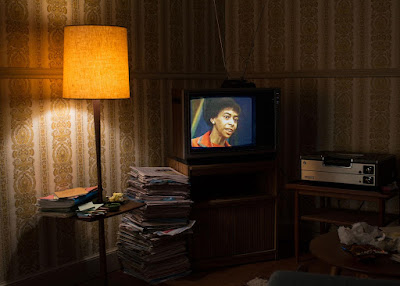Wolf's film has the immediate advantage of access to these tapes, since preserved digitally by the San Francisco-based Internet Archive; he could likely have made several thousand versions of this story while never reusing the same material. Here it all is, bearing witness in flickering, static-laced pictures: clips of Star Trek (a Stokes favourite, for its egalitarian worldview), sitcoms, adverts, sports and special reports, and day after day of news bulletins. (If documentarists had to pay appearance fees, Ted Koppel would be sitting pretty in retirement.) Wolf and his heroic editor Keiko Deguchi sporadically fashion hypnotic montages that set out, say, the turbulence of the early 1990s, or what the various channels were showing in the gap between the first and second planes striking the World Trade Center, using these mediated images to cast new light on old facts. (I hadn't realised the final episode of The Cosby Show went out in the middle of the L.A. riots in 1992 - a happenstance of scheduling that becomes more fascinating the more you consider it.) Much of the material serves to back up one of Stokes's abiding beliefs, namely that the small box in the corner of your living room has the potential to contain it all, the best and worst of ourselves; that's why she felt it merited such close, attentive, round-the-clock study. What Stokes recorded proves of particular value when it came to studying the media's approach to race relations over the past half-century. Several decades on, we can see that points made recently about injustice and inequality were always present, always there - it's just the volume was lower in the mid-1980s, or that they were mediated in a far less committed and forceful manner. (And sometimes the newsmen weren't really listening.)
That reading positions Stokes as a benign watchwoman keeping an increasingly square eye on America, an arbiter of right and wrong. (As her son Michael Metelits reveals, she died in December 2012, on the afternoon of the Sandy Hook shootings; as with so many of us when faced with such atrocities, she may have felt she'd seen quite enough.) The trouble with that reading is that Marion Stokes was often eccentric with it; the film troubles to question of her suitability for the role of arbiter. For one thing, she wasn't just a recorder and collector but a hoarder, stashing everything from top-of-the-line Apple products to syrup dispensers half-inched from the neighbourhood diners. Her identification with Steve Jobs meshes with her determination to apply her moralism to her own extended family, a process that pushed away everyone bar her paid employees. (Which is one way of ensuring some peace and quiet while you're watching your shows, I guess, but it hardly feels healthy.) The film benefits from Wolf's ability (much on display in 2013's Teenage, and in the later Spaceship Earth) to sublimate his craft so as to set the viewer thinking more fully about the implications of this story - and it is a story that bears sustained consideration. How can someone with such easy facility around images of the world be so bad up close with people? In some respects, the Marion Stokes story is a dry run for a recurring modern media narrative. Either way, it's a perfect story for a documentarist, because there are at least two possible lines of approach. One viewpoint sees Stokes as no less heroic than Howard Zinn - a woman reaching for the Memorex to set down an alternative history of the United States. The other is only too aware of the loneliness and solitude required to keep these tapeheads spinning like plates in a variety act. Wolf, arguably a more balanced onlooker than anybody else present, leaves us on a stirring note, watching all this information go public for the intended benefit of future generations. But we've been given ample reason over the past decade to question where all this information really gets us. That's why Recorder also plays as haunting, poignant, sad.
Recorder: The Marion Stokes Project is available to stream via MUBI and the BFI's subscription service, and to rent via Prime Video and Curzon Home Cinema.

No comments:
Post a Comment